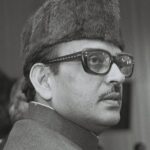Rajiv Gandhi: Legacy of Vision and Progress in Modern India
Rajiv Gandhi, the sixth Prime Minister of India, remains one of the most significant leaders in Indian history. His tenure as Prime Minister, though brief, marked a transformative period for India, bringing about numerous changes in technology, education, and the economy. Known for his modern outlook, Rajiv’s approach aimed to position India as a global leader in the 21st century. He believed in the power of technology and youth to shape the nation’s future, a vision that continues to influence India’s development today.
Early Life and Education
Rajiv Gandhi was born on August 20, 1944, into one of India’s most prominent political families. His father, Feroze Gandhi, was a well-known politician, and his grandmother, Indira Gandhi, served as the first female Prime Minister of India. Rajiv was the eldest son of Indira Gandhi, and his family played a pivotal role in shaping his political and personal life.
Rajiv’s early education took place in India and abroad. He attended the prestigious Doon School in Dehradun and later went to the UK to study at the prestigious Trinity College in Cambridge. Rajiv was not initially inclined towards politics; instead, he pursued a career in engineering and worked as a pilot for Indian Airlines after completing his studies.
Entry into Politics
Rajiv Gandhi’s entry into politics came unexpectedly, after the tragic death of his younger brother, Sanjay Gandhi, in a plane crash in 1980. At the time, Rajiv had been leading a quiet life as a commercial pilot. However, following his brother’s death, Rajiv was urged to step into the political arena by his mother, Indira Gandhi. He entered politics in 1981, joining the Indian National Congress party, which had been led by his mother since 1966.
Rajiv was quickly elevated to the role of General Secretary of the All India Congress Committee, and by 1984, he became the youngest Prime Minister of India at the age of 40 after the assassination of Indira Gandhi. His rise was both a response to the tragedy of his mother’s assassination and a new chapter in India’s political leadership.
Prime Ministership and Reforms
Rajiv Gandhi served as India’s Prime Minister from 1984 to 1989, during which he focused on modernizing the country’s infrastructure, promoting technological advancements, and improving the educational system.
- Technological Advancements and Information Revolution: One of Rajiv Gandhi’s most significant contributions was his push for technological advancement. Under his leadership, India saw the early stages of the Information Technology (IT) revolution. He advocated for the development of software and communication industries, which laid the foundation for India to become a global leader in IT services.
- Education and Empowerment: Rajiv Gandhi believed in the power of education and worked to expand the country’s educational infrastructure. His government launched the National Policy on Education in 1986, which aimed to make education more accessible and to promote technical education. He also emphasized the importance of higher education, which helped India build a strong pool of engineers, scientists, and professionals.
- Economic Liberalization and Market Reforms: Rajiv Gandhi understood the importance of modernizing India’s economy. His government made efforts to reduce government controls, encourage privatization, and promote a more market-driven economy. Though his tenure was marked by political instability, the economic foundations laid by his government contributed to India’s future economic growth.
Challenges and Controversies
Despite his progressive vision, Rajiv Gandhi faced significant challenges and controversies during his tenure.
- Political Instability and Opposition: Rajiv Gandhi’s tenure as Prime Minister was marked by political challenges, including growing opposition from regional parties and his inability to maintain a stable majority in the Indian Parliament. His government faced multiple allegations of corruption, most notably the Bofors scandal, which severely tarnished his reputation.
- Assassination of Rajiv Gandhi: Rajiv Gandhi’s life was tragically cut short on May 21, 1991, when he was assassinated by a suicide bomber belonging to the Liberation Tigers of Tamil Eelam (LTTE), a militant group from Sri Lanka. His assassination shocked the nation and marked a premature end to his political career.
Rajiv Gandhi’s Legacy and Impact on Society
Rajiv Gandhi’s legacy continues to resonate in various sectors of Indian society. He is often remembered for his vision of a modern India, where technology, education, and economic reforms played a key role in shaping the future.
- Technological Impact: Rajiv Gandhi’s policies laid the groundwork for India’s IT boom in the 1990s. His emphasis on the importance of computers and telecommunications helped India become a global hub for software development and outsourcing.
- Youth Empowerment: Rajiv Gandhi was known for his efforts to empower the youth of India. He understood the potential of India’s large young population and worked to ensure that they had the skills and education needed to thrive in the modern world. His policies on education, infrastructure, and employment continue to have a long-lasting impact on the nation.
- National Integration and Foreign Policy: Rajiv Gandhi’s leadership focused on national integration and strengthening India’s ties with the international community. He promoted peace and stability in South Asia and pursued a policy of non-alignment while building strategic relationships with the world’s major powers.
FAQs About Rajiv Gandhi
Q1: What is Rajiv Gandhi known for?
Rajiv Gandhi is known for his vision of a modern India, his efforts in advancing technology and education, and his role in shaping India’s information technology revolution.
Q2: How did Rajiv Gandhi contribute to the development of India?
Rajiv Gandhi focused on technological advancements, expanded education opportunities, and laid the foundations for economic reforms. He played a significant role in establishing India as a global player in the IT sector.
Q3: Why was Rajiv Gandhi assassinated?
Rajiv Gandhi was assassinated by a suicide bomber from the LTTE, a Tamil separatist group, due to his involvement in the Sri Lankan Civil War and his support for the Indian Peacekeeping Force (IPKF) in Sri Lanka.
Rajiv Gandhi’s tenure as Prime Minister is a defining moment in India’s history. His focus on modernity, technology, and the empowerment of youth set the stage for India’s rise in the global arena. Though his time in power was fraught with challenges, his contributions to the nation’s progress are still felt today. Rajiv Gandhi’s vision for a progressive, technology-driven India continues to inspire future generations of leaders.










